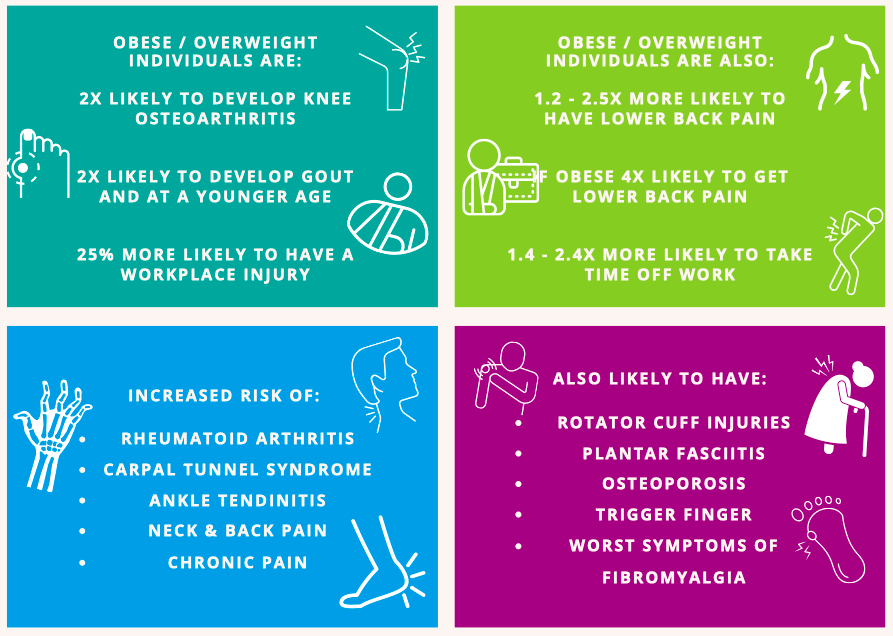Weight Management
Musculoskeletal (MSK) conditions are one of the biggest threats to the health of people who are overweight; 7 in 10 people who report living with a long term MSK condition are overweight or obese.
Over 6 in 10 adults (aged 16 +) and nearly 3 in 10 children (aged 2-15 years) in the UK are overweight or obese. Reducing childhood obesity may reduce the risk of persistent pain in to adolescence and later life.
Increased body weight puts you at a greater risk of Musculoskeletal conditions
Compared to people of normal body weight, overweight/obese individuals are:

How can body fat impact on musculoskeletal pain?
Excess fat- fatty tissues are thought to be a source of inflammatory chemicals in our bodies that can contribute to inflammation which negatively impacts multiple systems in the body, including increasing joint pain.
This explains why high levels of body fat are associated with osteoarthritis in non-weight bearing joints such as hands, where the loading isn’t weight related as it is in the knee.
What should you do to reduce your risk of body pain?
Body fat, and not BMI, is a more accurate predictor of musculoskeletal pain, especially osteoarthritis.
So to reduce your risk – focus on reducing your body fat, and try to maintain muscle mass. This might mean that you lose less weight overall but achieve a bigger reduction in your percentage of body fat, decreasing the level of inflammation in your system and consequently reducing your pain.
A combination of dietary management and exercise is the best strategy to improve symptoms.
Exercise has additional benefits other than just burning calories. Regular exercise reduces the number of inflammatory chemicals and increases anti-inflammatory chemicals in the body which may also reduce pain.
Obesity and Osteoarthritis
Obesity in early life predicts Osteo Arthritis (OA) many years later
For people with OA, weight loss improves symptoms and slows disease progression
For those who have joint replacements due to OA being over weight or obese is linked with additional complications, such as:
- Those who are morbidly obese benefit less from the surgery
- Artificial joints do not last as long in those who are obese
- Increased body weight increases the risk of surgical complications, longer hospital stays, major complications and higher rates of readmission after discharge
Key Tips for Weight Loss
Make realistic changes to your diet and activity, so it becomes part of your regular routine
Make long-term changes that will result in a steady rate of weight loss
Aim to lose 0.5kg to 1kg (1lb to 2lb) a week, until you achieve your healthy weight target
Where to get help?
NHS East Riding Health Trainers - https://www.nhs-health-trainers.co.uk/services/east-riding-of-yorkshire/healthtrainers/weight-loss/
Weight Wise (Hull GP) - speak to your GP to see whether you are eligible for a referral
Download the NHS weight loss guide - https://www.nhs.uk/live-well/healthy-weight/start-the-nhs-weight-loss-plan/
NHS One You Easy Meal App


 Healthy You
Healthy You